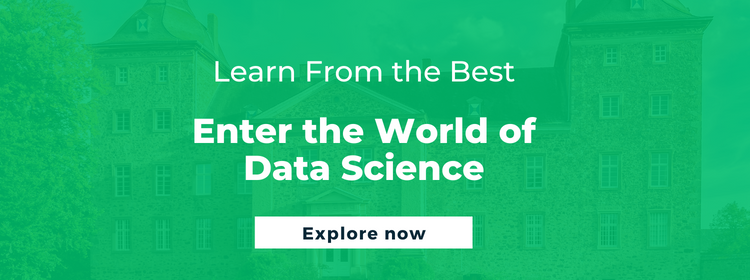Key Differences Between Data Analyst and Data Scientist: Which Role is Better?

In today’s data-driven era, companies recognize data’s vital role in propelling success. An annual 2022 survey by NewVantage Partners (strategic advisors to Fortune 500 companies) reveals that an overwhelming 92.1% of companies are seeing returns on their data investments, with 91.7% increasing their investments in data and Artificial Intelligence (AI). As the importance of data continues to grow, so do the career opportunities in this field. Data scientists and analysts are two vital roles companies rely on to extract insights and drive growth. Even though these roles are sometimes used interchangeably, there are some vital differences between data analyst and data scientist. Understanding these differences is essential for professionals pursuing a successful data-driven career. In this article, we dive into these two indispensable roles to help you understand the fundamental differences between data analyst and data scientist.
What is Data Science?
Data science is a multidisciplinary field that extracts actionable insights from data using various tools and processes. It combines statistics and mathematics, programming, machine learning, AI, and specific knowledge to uncover insights in complex data sets. Data science is widely used across finance, healthcare, marketing, and e-commerce industries to optimize processes and make data-driven decisions. Additionally, a data science project undergoes various stages, including data collection, processing, storage, and analysis.
What is Data Analysis?
Data analysis, on the other hand, is the process of cleaning and processing raw data to derive insights, identify patterns, and make informed decisions. The insights and statistics thus gained can help businesses reduce risks and make better data-driven decisions. Data analysis typically consists of various statistical and computational techniques, such as data cleaning, data wrangling, and data visualization. Like data science, data analysis, too, can be applied in various fields such as business, healthcare, and social sciences.
What Does a Data Scientist do?
 A data scientist is an analytics professional who uses statistical, computational, and analytical methods to collect, analyze, and interpret data. They work with large volumes of data and use statistical modeling, machine learning, data mining, and other techniques to develop and test hypotheses and identify patterns and trends in the data. They are commonly tasked with data gathering, cleaning, processing, and building statistical and predictive models to answer business questions and make informed decisions.
A data scientist is an analytics professional who uses statistical, computational, and analytical methods to collect, analyze, and interpret data. They work with large volumes of data and use statistical modeling, machine learning, data mining, and other techniques to develop and test hypotheses and identify patterns and trends in the data. They are commonly tasked with data gathering, cleaning, processing, and building statistical and predictive models to answer business questions and make informed decisions.
Roles and Responsibilities of Data Scientists
- Collecting and organizing data from various sources
- Cleaning and preprocessing raw data
- Creating algorithms and predictive models to predict future trends or outcomes
- Analyzing data to find patterns and trends
- Communicating the results of their analysis to nontechnical stakeholders
Key Skills for a Data Scientist
- Programming languages such as Python, R, Java, and Scala
- Advanced math, deep learning, and deployment
- Data visualization tools such as Excel VBA, Tableau, Qlik Sense, and Power BI
- Machine learning techniques such as classification, regression, clustering, and deep learning
- Business acumen and communication
ALSO READ: The Ultimate 2023 Data Science Roadmap: A 6-Step Guide to Success
What Does a Data Analyst do?
A data analyst collects and analyzes data from different sources to provide insights and support decision-making. They work with large volumes of data and use various analytical tools and techniques to extract meaningful insights, identify patterns, and find trends. Data analysts are responsible for data gathering, cleaning, and processing to ensure the accuracy and completeness of the data. They work closely with other stakeholders to understand their needs and provide actionable insights to validate business decisions. Data analysts focus primarily on analyzing data and less on building predictive models. However, they may still use predictive modeling techniques to identify trends or forecast future outcomes. While there may be some overlap with the work of data scientists, data analysts generally have more specialized skills in data analysis and statistical methods.
Roles and Responsibilities of a Data Analyst
- Identifying and collecting data from various sources such as databases, spreadsheets, or APIs
- Cleaning raw data to ensure the accuracy and integrity of the data
- Analyzing the data using various analytical and statistical methods
- Interpreting and presenting data to communicate insights to stakeholders
Key Skills for a Data Analyst
- Programming languages such as Python, SAS, and R
- Data analysis tools such as Excel, SQL, and Tableau
- Data visualization tools such as Excel, Jupyter Notebook, Tableau, and Qlik Sense
- Math and statistics such as computer simulation, matrix, graphs, and sampling distribution
Until now, we have explored the key similarities and differences between data analyst and data scientist. To understand both roles, let’s briefly overview the career paths for data analysts and data scientists.
Data Scientist Career Scope and Salary
A highly lucrative and technical data scientist position can open up excellent earning opportunities. According to the U.S. Bureau of Labor Statistics, the employment of data scientists is projected to grow by 36% from 2021 to 2031. That’s much faster than the average for all occupations, indicative of the role’s high demand. Additionally, Glassdoor reports that the average annual salary for a data scientist in the U.S. is $121,037.
Data Analyst Career Scope and Salary
According to the U.S. Bureau of Labor Statistics, jobs for research analysts, mathematicians, and statisticians are projected to grow 23% and 31%, respectively, between 2021 to 2031. In addition to the rise in job prospects, data analysts also enjoy lucrative salary packages. According to Glassdoor, the average annual salary of data analysts in the U.S. is $72,267.
Frequently Asked Questions
1. What are the Qualifications and Education Required for Data Analysts and Data Scientists?
 Both data analysts and data scientists typically require a bachelor’s degree in a relevant field, such as statistics, mathematics, computer science, or engineering. However, data scientists often require advanced degrees, like a master’s or a Ph.D., to acquire advanced technical skills for their role.
Both data analysts and data scientists typically require a bachelor’s degree in a relevant field, such as statistics, mathematics, computer science, or engineering. However, data scientists often require advanced degrees, like a master’s or a Ph.D., to acquire advanced technical skills for their role.
2. Are Data Analysts and Data Scientists Interchangeable Roles in Businesses?
While data analysts and scientists deal with data, they are not interchangeable. There are various differences between data analyst and data scientist. Data analysts and data scientists require different levels of expertise, skills, and responsibilities. Specifically, data analysts are typically responsible for collecting and analyzing data to identify trends and insights. Conversely, data scientists are responsible for developing and implementing complex machine learning models and algorithms to solve business problems.
ALSO READ: What is Healthcare Data Analytics? Why is it Important for Patient Care?
Excelling in Data Science and Data Analytics with Emeritus
Hopefully, by the end of this guide, you will have gained a better understanding of the differences between data analyst and data scientist. You can make an informed decision about which career path is right for you. If you are interested in pursuing a career in a data-driven field and looking to enhance your skills, consider exploring the data science courses offered by Emeritus.
Write to us at content@emeritus.org






